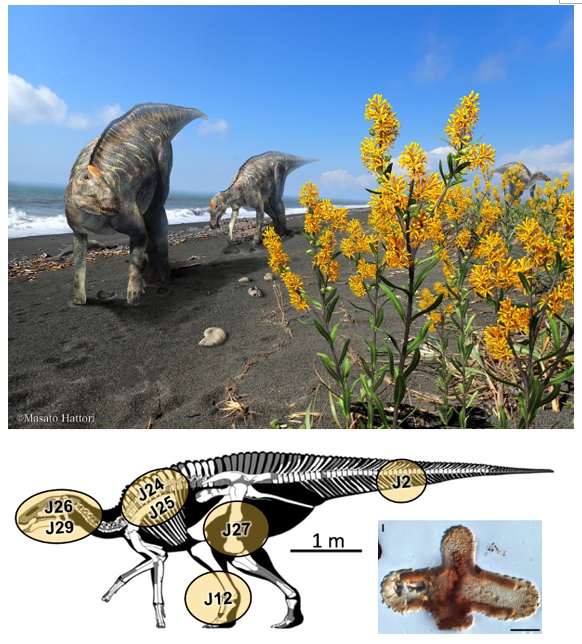DATE2023.12.07
Discovery of the Late Cretaceous angiosperm pollen fossil from the nearly complete dinosaur Kamuysaurus (Mukawa-ryu) fossil-bearing bone bed in Japan
Shizuoka University
School of Science, The University of Tokyo
Summary of Presentations
Assistant Professor LEGRAND Julien and his research group (Shizuoka University, Mukawa Museum, The University of Tokyo) have discovered many pollen fossils of Kamuysaurus japonicus, commonly known as "Mukawa Ryu," a nearly complete dinosaur skeleton in Japan, which was found in Hobetsu, Mukawa-cho, Hokkaido. In the dinosaur-bearing bone bed, many pollen and spores fossils were discovered, including the first pollen of angiosperm plant ever produced in Japan.
Pollen assemblage in the dinosaur Kamuysaurus japonicus-bearing bone bed include the abundant angiosperm of the early Maastrichtian, but no pre-Campanian angiosperm based on newly compiled pollen stratigraphy (a study to determine the geological age based on pollen fossils). This supports the idea that Kamuysaurus japonicus lived in the early Maastrichtian period, after the floral change across the Campanian-Maastrichtian global cooling. Because the Kamuysaurus-bearing Yezo Group is the marine fossil-rich standard stratigraphic sequence of the Northwest Pacific region during the Cretaceous, it is expected that the evolutionary process of angiosperms during the same period can be elucidated with high temporal-resolution.
The results of this study were published in the electronic edition of the international journal "Palaeontological Research" on November 30.

Figure: Illustration of Triprojectate pollen-derived Byakudaniformes and Kamuissaurus japonicus blooming on the coast (top) Kamuissaurus fossil site and tri-groove pollen from which pollen fossils were found in this study. Courtesy of Masato Hattori.
Associate Professor Masayuki Ikeda of the Department of Earth and Planetary Science participated in this research.
For more information, please visit the website of Shizuoka University (In Japanese).
Journal
-
Journal name Palaeontological ResearchTitle of paper


